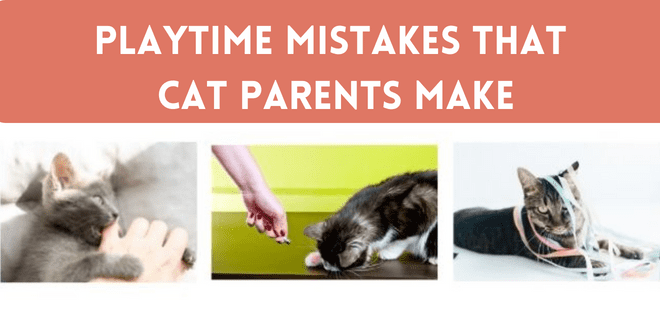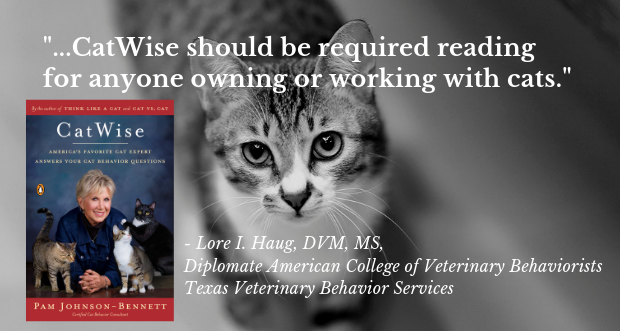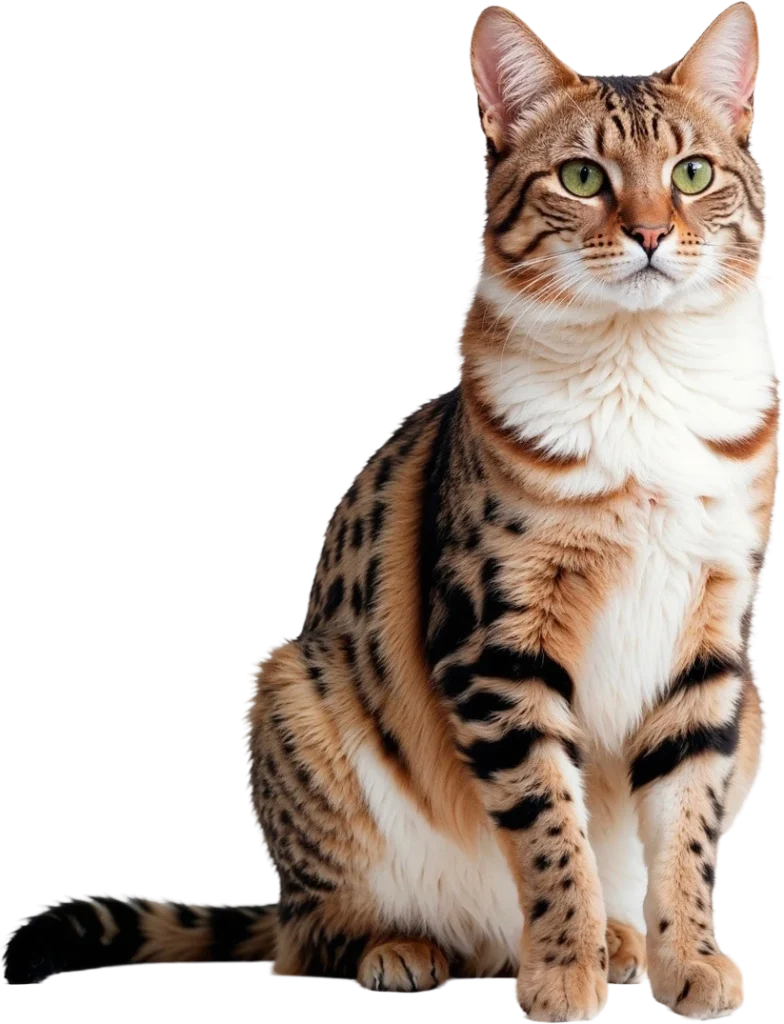
Playtime with your cat may seem like a no-brainer but there are actually a few mistakes you can make that can be counter-productive to your cat’s enjoyment of the game. Some mistakes in your playtime technique can even contribute to behavior problems. That may be surprising to learn but when you think about the technique cats use to hunt (stealth and stalking) and the frantic counter-intuitive way we ask them to play (constant high-speed motion and frustration), it’s very likely that our methods create more negative reactions than positive. Here are some common mistakes I see people make:
Don’t Use Your Hands as Toys
Wiggling fingers are definitely convenient when your cat is nearby and in play-mode but what actually ends up happening is that you send the unintentional message that biting flesh is acceptable behavior. If the cat learns that biting during play is allowed, she’ll learn biting is an acceptable and effective form of communication whenever she wants to get a point across. The point could be that she wants attention or maybe wants to be left alone. The association your cat has with your hands should only be that they are used for gentle petting and holding. If they are also viewed as toys, it can lead to a painful injury should the cat decide to playfully bite another family member other than yourself. That family member could be a child or an elderly relative. Don’t send mixed messages about biting – even when it’s done in play.
This Isn’t a Wrestling Match
Don’t use your hands to pin the cat down or wrestle. In addition to the danger of you ending up injured, it changes the tone from play to battle where the cat views you as an opponent. Cats don’t wrestle their prey to the ground and they don’t want to be wrestled to the ground by an adult human. It’s not a fair game at that point. Additionally, if you wrestle your cat and have her on her back, she will then be put in the defensive aggressive posture. You may find yourself not only getting bitten but scratched as well.
Don’t Prevent Your Cat From Being Successful
Nobody enjoys playing a game if they never get a chance to win. If you wave the toy all over and keep it out of the cat’s reach, it just leads to frustration. Playtime needs to be physically AND mentally rewarding. If your cat chases, pounces, stalks, leaps and attacks the toy but never gets to capture it because you’ve kept it out of reach, it just becomes a physically exhausting exercise in frustration. This leads me to the topic of laser light toys. Although they’re popular because you can sit in one location and send the laser light all over the room, the cat doesn’t get the mental satisfaction of having actually captured prey. Even if the cat manages to get a paw on the light, she’ll realize there’s nothing under there. Cats have carpal whiskers on their forepaws that let them know when they’re successfully captured prey and whether their capture is moving or not. Capturing a laser toy? A big nothing!
During interactive play sessions your cat needs as much mental satisfaction as physical activity. The cat needs opportunities for successful captures throughout the game. Think of the toy as prey that gets caught but manages to wiggle away a few times. Toward the game’s end, move the toy slower and eventually allow the cat to have one final grand capture.
Good Toys or Bad Toys?
I’ve already explained the negatives of laser light toys, but there are other types of toys that aren’t appropriate for cat play. The image of cats playing with balls of yarn is a familiar one to almost everyone but in reality, yarn is a dangerous toy. Cats have backward-facing barbs on their tongues and items such as string, yard, or thread can can stuck on the tongue in a way that becomes impossible for her to dislodge. Because of the direction of the barbs the only direction the yarn can go is down. This can lead to serious health complications. Even if a cat doesn’t swallow yarn or string, there’s a serious risk of strangulation.
Interactive toys (fishing pole-type) toys are wonderful but they shouldn’t be left out when you’ve finished playing with your cat. There’s a risk of strangulation. I’ve seen cats panic when they get the string wrapped around a paw or caught on their collar. All interactive toys are to be used under your supervision and then put away in a cabinet or closet between play sessions. For solo play, leave out safe toys such as fuzzy mice, mylar crinkly balls, and other cat-safe fun objects.
When purchasing toys, check for safety to ensure there aren’t loosely glued-on parts that a cat could easily pull off. Remove anything from a toy that could pose a danger. In addition, when shopping, try to match the toy to your cat’s personality, size and ability. A shy or fearful cat may prefer a toy that appears less threatening and doesn’t make any noise. A common mistake I see some people make is to buy too big of a toy or one that actually ends up looking like a threat to the cat. When hunting, cats choose prey that is smaller and easy to capture. If the toy is too big or intimidating, it becomes more of an opponent.
I also see some cat parents give up on playtime because the cat doesn’t seem interested in the purchases made. You may have to do a little toy testing to find the kind of toys your cat likes best. Some cats like soft toys that feel more life-like when they bite them, whereas other cats prefer hard toys that can more easily be rolled around. Take the time to observe how your cat plays and the types of textures and sizes of objects she finds most appealing.
Don’t Dangle the Toy in the Cat’s Face
No prey in its right mind would go up to the cat and willingly offer itself up as lunch. A cat’s prey-drive is triggered by movements that move across or away from her visual field. Movement coming at her is confusing and can put her on the defensive. Movement in the cat’s direction turns the toy into an opponent.
Don’t End the Game Abruptly
Imagine you’re a cat and you’re having a great time and then suddenly the toy is whisked away into a closet and you haven’t even had time to capture it, or your energy level is just starting to rev up. No matter how much time you plan on dedicating to the playtime, wind the action down toward the end of the game so the cat can start to relax again and feel as if she has successfully done her job. Think of it as the cool-down after an exercise.
Need More Information?
For more information on cat behavior and training, check out the best-selling books by Pam Johnson-Bennett. Pam’s books are available at bookstores and online. We’ve included Amazon links here on our website.





